Effective Communication in Your Profession: Analysis and Reflection
VerifiedAdded on 2022/08/24
|6
|1199
|16
Report
AI Summary
This report delves into the crucial aspects of communication within a professional context, focusing on the student's perspective. It identifies essential behaviors for success, emphasizing interpersonal skills such as engagement, communication, and collaboration. The report explores interpersonal communication stereotypes, offering insights into how these perceptions can affect interactions. It also examines the cultural nuances of greetings in a work environment, with a particular focus on the significance of handshakes. The analysis covers various aspects of handshakes, including eye contact, firmness, length, expression, and voice clarity. The report provides a comprehensive overview of communication strategies and their impact on professional relationships, supported by relevant references.
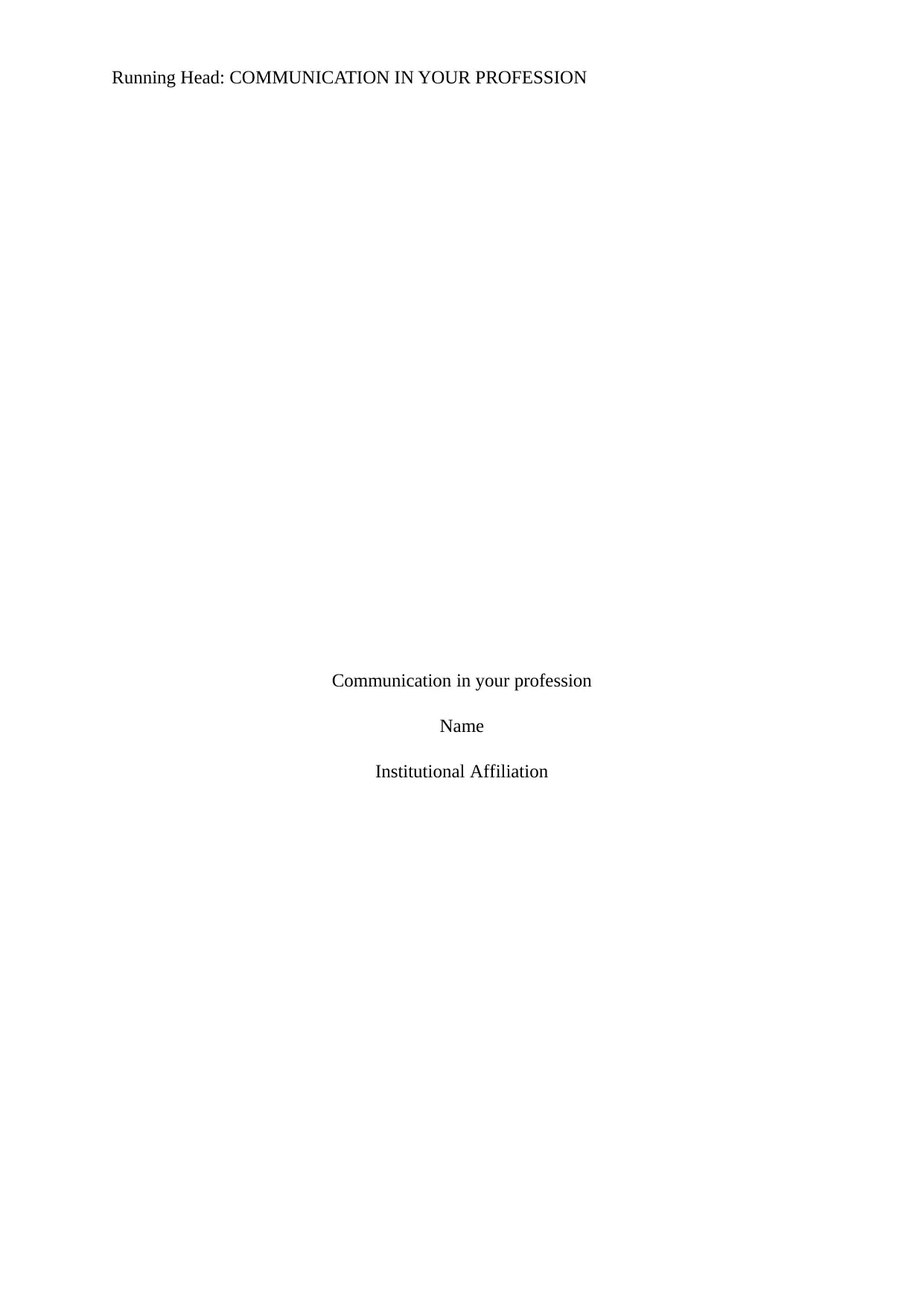
Running Head: COMMUNICATION IN YOUR PROFESSION
Communication in your profession
Name
Institutional Affiliation
Communication in your profession
Name
Institutional Affiliation
Paraphrase This Document
Need a fresh take? Get an instant paraphrase of this document with our AI Paraphraser
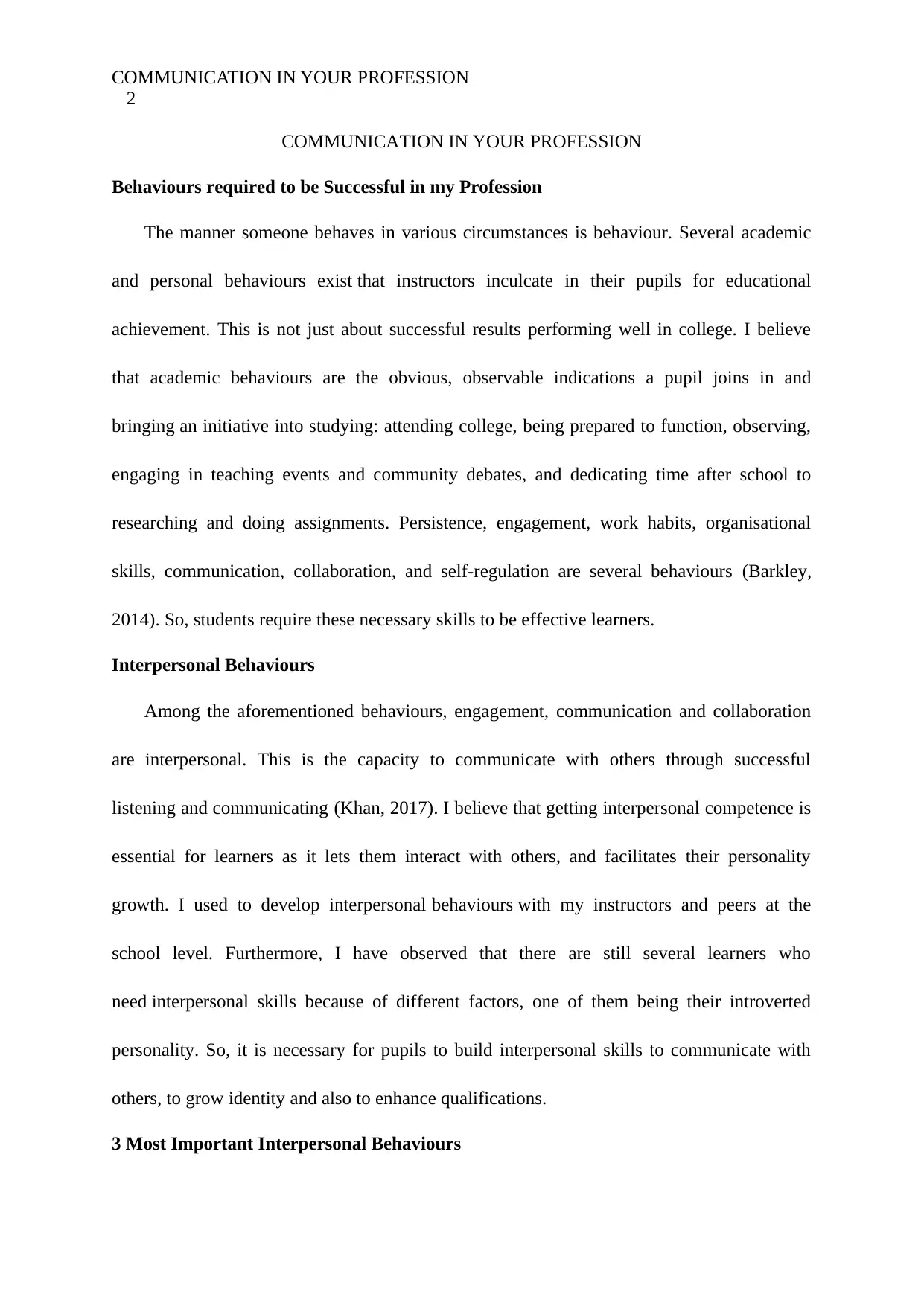
COMMUNICATION IN YOUR PROFESSION
2
COMMUNICATION IN YOUR PROFESSION
Behaviours required to be Successful in my Profession
The manner someone behaves in various circumstances is behaviour. Several academic
and personal behaviours exist that instructors inculcate in their pupils for educational
achievement. This is not just about successful results performing well in college. I believe
that academic behaviours are the obvious, observable indications a pupil joins in and
bringing an initiative into studying: attending college, being prepared to function, observing,
engaging in teaching events and community debates, and dedicating time after school to
researching and doing assignments. Persistence, engagement, work habits, organisational
skills, communication, collaboration, and self-regulation are several behaviours (Barkley,
2014). So, students require these necessary skills to be effective learners.
Interpersonal Behaviours
Among the aforementioned behaviours, engagement, communication and collaboration
are interpersonal. This is the capacity to communicate with others through successful
listening and communicating (Khan, 2017). I believe that getting interpersonal competence is
essential for learners as it lets them interact with others, and facilitates their personality
growth. I used to develop interpersonal behaviours with my instructors and peers at the
school level. Furthermore, I have observed that there are still several learners who
need interpersonal skills because of different factors, one of them being their introverted
personality. So, it is necessary for pupils to build interpersonal skills to communicate with
others, to grow identity and also to enhance qualifications.
3 Most Important Interpersonal Behaviours
2
COMMUNICATION IN YOUR PROFESSION
Behaviours required to be Successful in my Profession
The manner someone behaves in various circumstances is behaviour. Several academic
and personal behaviours exist that instructors inculcate in their pupils for educational
achievement. This is not just about successful results performing well in college. I believe
that academic behaviours are the obvious, observable indications a pupil joins in and
bringing an initiative into studying: attending college, being prepared to function, observing,
engaging in teaching events and community debates, and dedicating time after school to
researching and doing assignments. Persistence, engagement, work habits, organisational
skills, communication, collaboration, and self-regulation are several behaviours (Barkley,
2014). So, students require these necessary skills to be effective learners.
Interpersonal Behaviours
Among the aforementioned behaviours, engagement, communication and collaboration
are interpersonal. This is the capacity to communicate with others through successful
listening and communicating (Khan, 2017). I believe that getting interpersonal competence is
essential for learners as it lets them interact with others, and facilitates their personality
growth. I used to develop interpersonal behaviours with my instructors and peers at the
school level. Furthermore, I have observed that there are still several learners who
need interpersonal skills because of different factors, one of them being their introverted
personality. So, it is necessary for pupils to build interpersonal skills to communicate with
others, to grow identity and also to enhance qualifications.
3 Most Important Interpersonal Behaviours
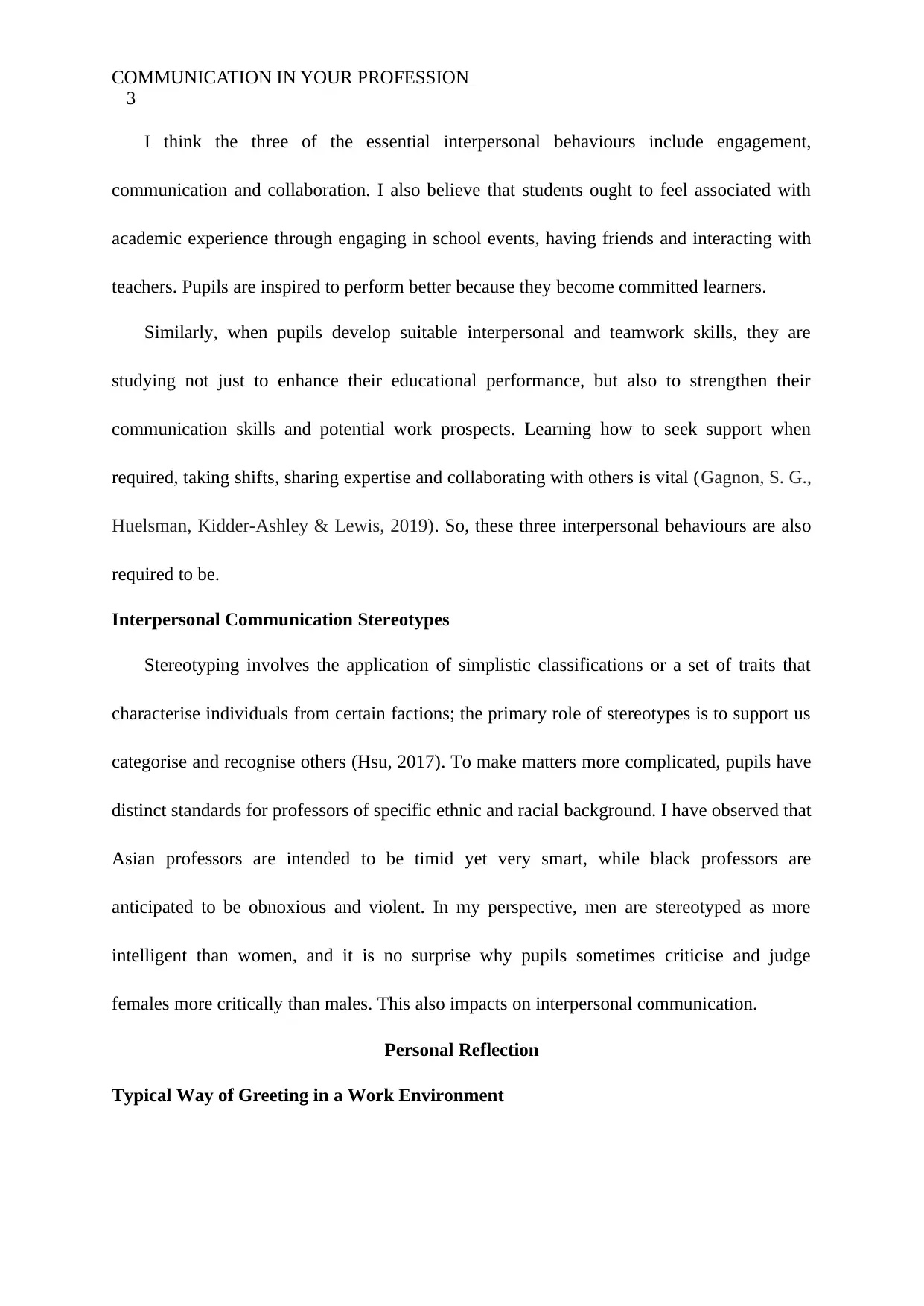
COMMUNICATION IN YOUR PROFESSION
3
I think the three of the essential interpersonal behaviours include engagement,
communication and collaboration. I also believe that students ought to feel associated with
academic experience through engaging in school events, having friends and interacting with
teachers. Pupils are inspired to perform better because they become committed learners.
Similarly, when pupils develop suitable interpersonal and teamwork skills, they are
studying not just to enhance their educational performance, but also to strengthen their
communication skills and potential work prospects. Learning how to seek support when
required, taking shifts, sharing expertise and collaborating with others is vital (Gagnon, S. G.,
Huelsman, Kidder-Ashley & Lewis, 2019). So, these three interpersonal behaviours are also
required to be.
Interpersonal Communication Stereotypes
Stereotyping involves the application of simplistic classifications or a set of traits that
characterise individuals from certain factions; the primary role of stereotypes is to support us
categorise and recognise others (Hsu, 2017). To make matters more complicated, pupils have
distinct standards for professors of specific ethnic and racial background. I have observed that
Asian professors are intended to be timid yet very smart, while black professors are
anticipated to be obnoxious and violent. In my perspective, men are stereotyped as more
intelligent than women, and it is no surprise why pupils sometimes criticise and judge
females more critically than males. This also impacts on interpersonal communication.
Personal Reflection
Typical Way of Greeting in a Work Environment
3
I think the three of the essential interpersonal behaviours include engagement,
communication and collaboration. I also believe that students ought to feel associated with
academic experience through engaging in school events, having friends and interacting with
teachers. Pupils are inspired to perform better because they become committed learners.
Similarly, when pupils develop suitable interpersonal and teamwork skills, they are
studying not just to enhance their educational performance, but also to strengthen their
communication skills and potential work prospects. Learning how to seek support when
required, taking shifts, sharing expertise and collaborating with others is vital (Gagnon, S. G.,
Huelsman, Kidder-Ashley & Lewis, 2019). So, these three interpersonal behaviours are also
required to be.
Interpersonal Communication Stereotypes
Stereotyping involves the application of simplistic classifications or a set of traits that
characterise individuals from certain factions; the primary role of stereotypes is to support us
categorise and recognise others (Hsu, 2017). To make matters more complicated, pupils have
distinct standards for professors of specific ethnic and racial background. I have observed that
Asian professors are intended to be timid yet very smart, while black professors are
anticipated to be obnoxious and violent. In my perspective, men are stereotyped as more
intelligent than women, and it is no surprise why pupils sometimes criticise and judge
females more critically than males. This also impacts on interpersonal communication.
Personal Reflection
Typical Way of Greeting in a Work Environment
⊘ This is a preview!⊘
Do you want full access?
Subscribe today to unlock all pages.

Trusted by 1+ million students worldwide
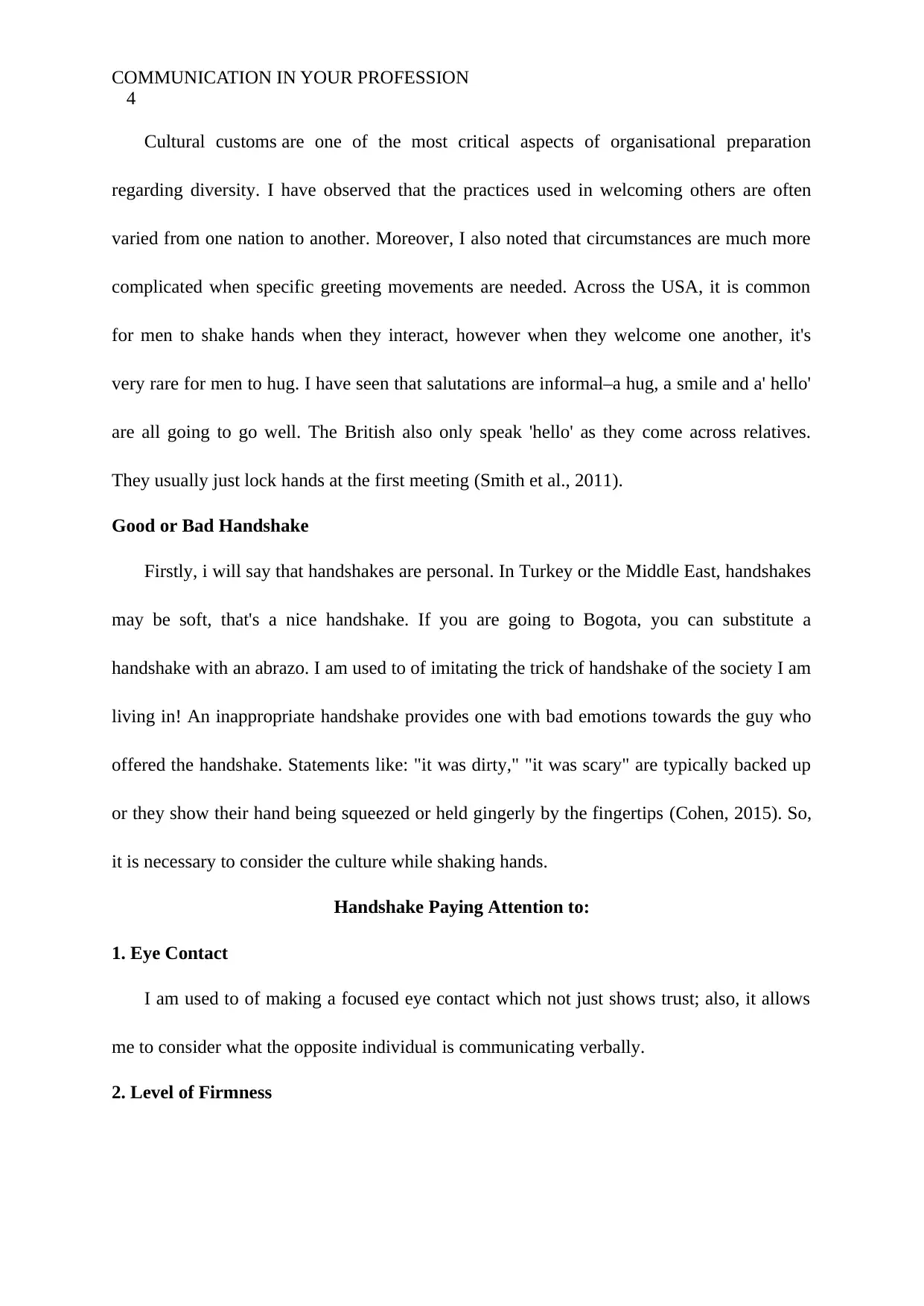
COMMUNICATION IN YOUR PROFESSION
4
Cultural customs are one of the most critical aspects of organisational preparation
regarding diversity. I have observed that the practices used in welcoming others are often
varied from one nation to another. Moreover, I also noted that circumstances are much more
complicated when specific greeting movements are needed. Across the USA, it is common
for men to shake hands when they interact, however when they welcome one another, it's
very rare for men to hug. I have seen that salutations are informal–a hug, a smile and a' hello'
are all going to go well. The British also only speak 'hello' as they come across relatives.
They usually just lock hands at the first meeting (Smith et al., 2011).
Good or Bad Handshake
Firstly, i will say that handshakes are personal. In Turkey or the Middle East, handshakes
may be soft, that's a nice handshake. If you are going to Bogota, you can substitute a
handshake with an abrazo. I am used to of imitating the trick of handshake of the society I am
living in! An inappropriate handshake provides one with bad emotions towards the guy who
offered the handshake. Statements like: "it was dirty," "it was scary" are typically backed up
or they show their hand being squeezed or held gingerly by the fingertips (Cohen, 2015). So,
it is necessary to consider the culture while shaking hands.
Handshake Paying Attention to:
1. Eye Contact
I am used to of making a focused eye contact which not just shows trust; also, it allows
me to consider what the opposite individual is communicating verbally.
2. Level of Firmness
4
Cultural customs are one of the most critical aspects of organisational preparation
regarding diversity. I have observed that the practices used in welcoming others are often
varied from one nation to another. Moreover, I also noted that circumstances are much more
complicated when specific greeting movements are needed. Across the USA, it is common
for men to shake hands when they interact, however when they welcome one another, it's
very rare for men to hug. I have seen that salutations are informal–a hug, a smile and a' hello'
are all going to go well. The British also only speak 'hello' as they come across relatives.
They usually just lock hands at the first meeting (Smith et al., 2011).
Good or Bad Handshake
Firstly, i will say that handshakes are personal. In Turkey or the Middle East, handshakes
may be soft, that's a nice handshake. If you are going to Bogota, you can substitute a
handshake with an abrazo. I am used to of imitating the trick of handshake of the society I am
living in! An inappropriate handshake provides one with bad emotions towards the guy who
offered the handshake. Statements like: "it was dirty," "it was scary" are typically backed up
or they show their hand being squeezed or held gingerly by the fingertips (Cohen, 2015). So,
it is necessary to consider the culture while shaking hands.
Handshake Paying Attention to:
1. Eye Contact
I am used to of making a focused eye contact which not just shows trust; also, it allows
me to consider what the opposite individual is communicating verbally.
2. Level of Firmness
Paraphrase This Document
Need a fresh take? Get an instant paraphrase of this document with our AI Paraphraser
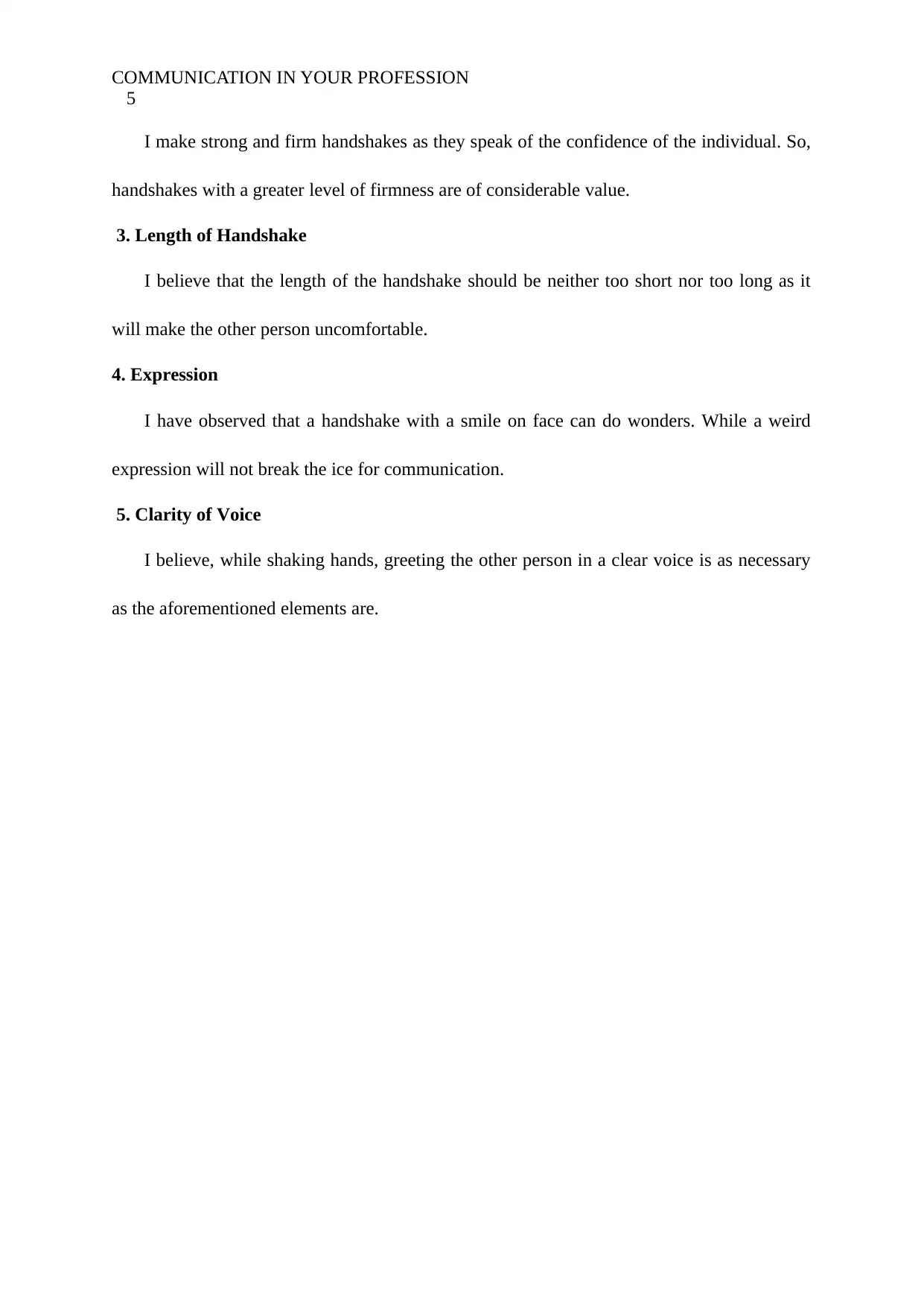
COMMUNICATION IN YOUR PROFESSION
5
I make strong and firm handshakes as they speak of the confidence of the individual. So,
handshakes with a greater level of firmness are of considerable value.
3. Length of Handshake
I believe that the length of the handshake should be neither too short nor too long as it
will make the other person uncomfortable.
4. Expression
I have observed that a handshake with a smile on face can do wonders. While a weird
expression will not break the ice for communication.
5. Clarity of Voice
I believe, while shaking hands, greeting the other person in a clear voice is as necessary
as the aforementioned elements are.
5
I make strong and firm handshakes as they speak of the confidence of the individual. So,
handshakes with a greater level of firmness are of considerable value.
3. Length of Handshake
I believe that the length of the handshake should be neither too short nor too long as it
will make the other person uncomfortable.
4. Expression
I have observed that a handshake with a smile on face can do wonders. While a weird
expression will not break the ice for communication.
5. Clarity of Voice
I believe, while shaking hands, greeting the other person in a clear voice is as necessary
as the aforementioned elements are.
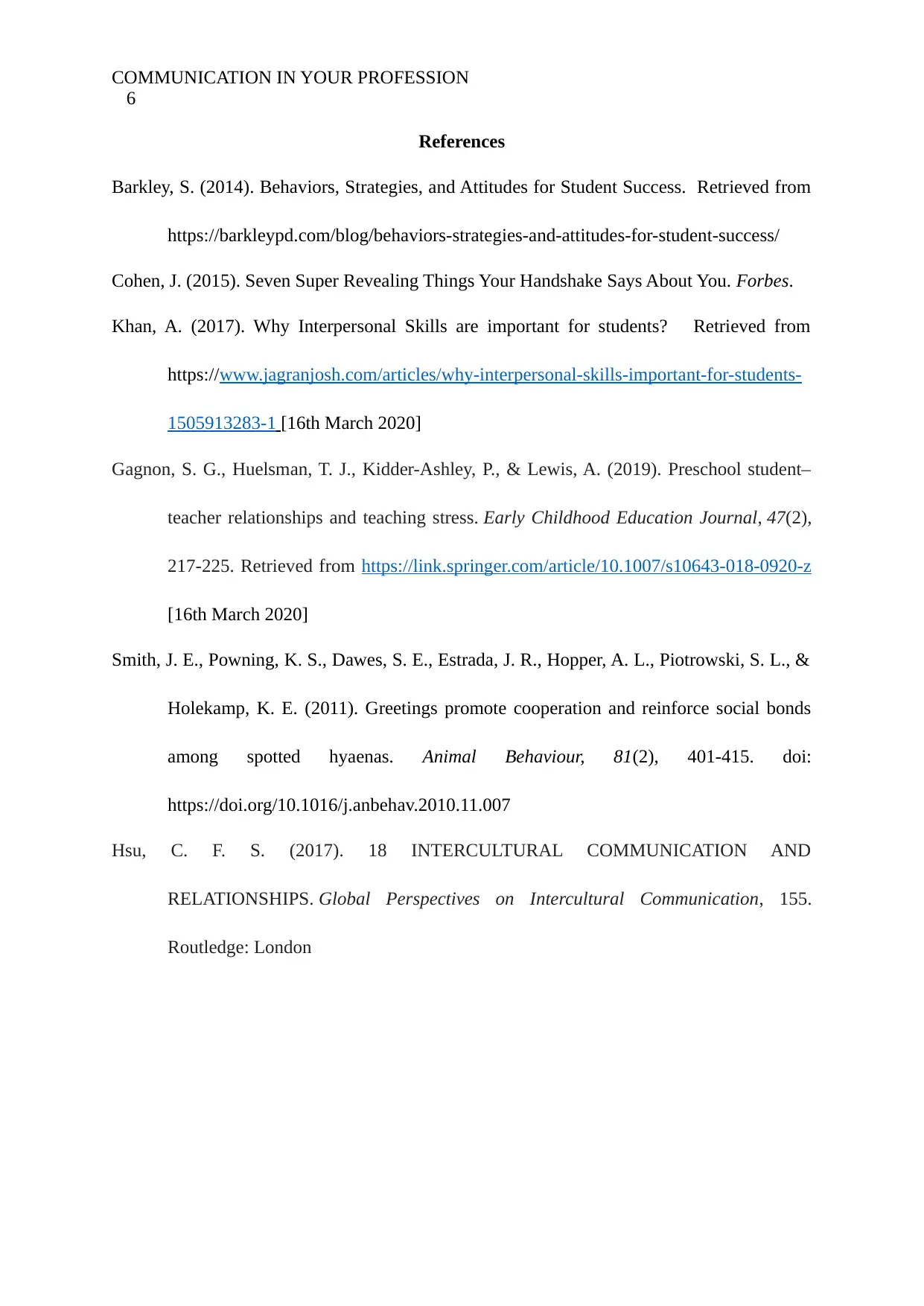
COMMUNICATION IN YOUR PROFESSION
6
References
Barkley, S. (2014). Behaviors, Strategies, and Attitudes for Student Success. Retrieved from
https://barkleypd.com/blog/behaviors-strategies-and-attitudes-for-student-success/
Cohen, J. (2015). Seven Super Revealing Things Your Handshake Says About You. Forbes.
Khan, A. (2017). Why Interpersonal Skills are important for students? Retrieved from
https://www.jagranjosh.com/articles/why-interpersonal-skills-important-for-students-
1505913283-1 [16th March 2020]
Gagnon, S. G., Huelsman, T. J., Kidder-Ashley, P., & Lewis, A. (2019). Preschool student–
teacher relationships and teaching stress. Early Childhood Education Journal, 47(2),
217-225. Retrieved from https://link.springer.com/article/10.1007/s10643-018-0920-z
[16th March 2020]
Smith, J. E., Powning, K. S., Dawes, S. E., Estrada, J. R., Hopper, A. L., Piotrowski, S. L., &
Holekamp, K. E. (2011). Greetings promote cooperation and reinforce social bonds
among spotted hyaenas. Animal Behaviour, 81(2), 401-415. doi:
https://doi.org/10.1016/j.anbehav.2010.11.007
Hsu, C. F. S. (2017). 18 INTERCULTURAL COMMUNICATION AND
RELATIONSHIPS. Global Perspectives on Intercultural Communication, 155.
Routledge: London
6
References
Barkley, S. (2014). Behaviors, Strategies, and Attitudes for Student Success. Retrieved from
https://barkleypd.com/blog/behaviors-strategies-and-attitudes-for-student-success/
Cohen, J. (2015). Seven Super Revealing Things Your Handshake Says About You. Forbes.
Khan, A. (2017). Why Interpersonal Skills are important for students? Retrieved from
https://www.jagranjosh.com/articles/why-interpersonal-skills-important-for-students-
1505913283-1 [16th March 2020]
Gagnon, S. G., Huelsman, T. J., Kidder-Ashley, P., & Lewis, A. (2019). Preschool student–
teacher relationships and teaching stress. Early Childhood Education Journal, 47(2),
217-225. Retrieved from https://link.springer.com/article/10.1007/s10643-018-0920-z
[16th March 2020]
Smith, J. E., Powning, K. S., Dawes, S. E., Estrada, J. R., Hopper, A. L., Piotrowski, S. L., &
Holekamp, K. E. (2011). Greetings promote cooperation and reinforce social bonds
among spotted hyaenas. Animal Behaviour, 81(2), 401-415. doi:
https://doi.org/10.1016/j.anbehav.2010.11.007
Hsu, C. F. S. (2017). 18 INTERCULTURAL COMMUNICATION AND
RELATIONSHIPS. Global Perspectives on Intercultural Communication, 155.
Routledge: London
⊘ This is a preview!⊘
Do you want full access?
Subscribe today to unlock all pages.

Trusted by 1+ million students worldwide
1 out of 6
Related Documents
Your All-in-One AI-Powered Toolkit for Academic Success.
+13062052269
info@desklib.com
Available 24*7 on WhatsApp / Email
![[object Object]](/_next/static/media/star-bottom.7253800d.svg)
Unlock your academic potential
Copyright © 2020–2026 A2Z Services. All Rights Reserved. Developed and managed by ZUCOL.



